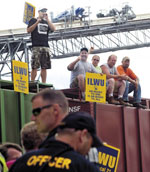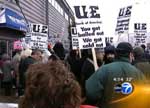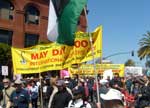
Showdown on West Coast Docks: The Battle of Longview
(November 2011).
click on photo for article

Chicago Plant Occupation Electrifies Labor
(December 2008).
click on photo for article

May Day Strike Against the War Shuts
Down
U.S. West Coast Ports
(May 2008)
click on photo for article
July 2012
Labor Must
Clean its Own House:
For a Class-Struggle Opposition
in the Union Movement
By the
Portland Trotskyist Study Group
In a recent article entitled “Fighting for the Soul of the Carpenters Union,” Workers Action writes about the Reform Slate of United Brotherhood of Carpenters Union Local 156. The members of the slate had organized a campaign aimed at resisting labor-employer partnership bargaining and giving more power and control to the union membership. While its program does not go beyond militant trade-unionism, the members of the Reform Slate have been brought up on charges by the incumbent union leaders. They aren’t guilty of anything except trying to represent themselves and fellow union members by ousting an entrenched leadership that ignores the rights of the membership and sells out to the bosses. But in defending them the Workers Action article repeatedly favorably references the Landrum-Griffin Act, also known as the Labor Management Reporting and Disclosure Act (LMRDA) of 1959.
The LMRDA was the result of an offensive by the ruling class, spearheaded by Democrat Bobby Kennedy – together with right-wing Republican Barry Goldwater – to seek to smash the growing power of the Teamsters union in particular. Holding the Landrum-Griffin Act up as an alternative for labor dissidents perpetuates the lie that the government is a neutral body that can make unbiased decisions on our behalf. The way that rights under the LMRDA are accessed is by filing suit in court. The government already has a team they play for, and it’s the bosses’ team every time. Asking them to solve internal labor disputes is issuing an open invitation for our bosses to destroy our unions, and that is unacceptable.
 Banner
of Carpenters Local 156 at Portland,
Oregon May Day, 2012.
Banner
of Carpenters Local 156 at Portland,
Oregon May Day, 2012.
(Internationalist
photo)
The support for the Reform Slate of Local 156 reflected widespread opposition in the local to a leadership that had sold out members by agreeing to reopen a five-year contract that had been voted on by the membership each year that it was in place, and agreeing each time to less money than the initial agreement. In addition, several locals in Oregon were combined into one, making it difficult for many members to attend meetings or have a voice in decision making. The reform opposition flyered worksites, organized fundraisers and set up a network of communication for their campaign, all perfectly within their rights as union members.
Members of the Reform Slate were able to do important outreach and solidarity work with other unions, voting to raise the demand on May Day for a 6-hour workday with no cut in pay, as is written in the Carpenters union constitution. They also got Local 156 to come out in open support for Longview ILWU Local 21 in their struggle with employer EGT, criticizing Operating Engineers Local 701 and even members of the UBC for working behind Local 21 picket lines.
 The Reform Slate won 15 out of 17
district council delegate seats and 5 executive
board positions. Twelve of the reformers that
were elected last February as the leadership of
Carpenters Local 156 were convicted in a rigged
trial. They were accused of phone-banking to get
out the vote from the union hall, which isn’t
against the rules. However, they were charged by
the incumbent regional council leadership with
causing dissent in the ranks, failing to uphold
the union oath and defrauding the union. The
charges are baseless, and an obvious attempt at
preventing the opposition from taking office.
The Reform Slate won 15 out of 17
district council delegate seats and 5 executive
board positions. Twelve of the reformers that
were elected last February as the leadership of
Carpenters Local 156 were convicted in a rigged
trial. They were accused of phone-banking to get
out the vote from the union hall, which isn’t
against the rules. However, they were charged by
the incumbent regional council leadership with
causing dissent in the ranks, failing to uphold
the union oath and defrauding the union. The
charges are baseless, and an obvious attempt at
preventing the opposition from taking office.
Even after the opposition won a second election, ordered by the international leadership, the onslaught from the incumbent leaders continued. In order to silence the Reform Slate, the leadership reappointed a trial committee twice, excluding any members from Oregon. In spite of a letter from the Reform Slate stating objection to the process the Pacific Northwest Regional Council used, citing that there was no proof that the trial committee was selected by a lottery as is mandated by the District Council Bylaws, the trial proceeded. Once the planned convictions were made official, members of the opposition were fined as much as $1,500 and stripped of their union privileges including the right to hold office for up to 6 years. The worst of the fines were aimed at the reformers who were elected to important e-board positions, but several others were charged as well.
After two elections, and an unnecessary trial proceeding, members of the Reform Slate and the members who voted for them had their rights trampled thoroughly. Opposing the rigged trial is a fight not just for members of Local 156, but for all Carpenters. The last thing the ranks need in their unions now is the government, who will always represent the interests of the employers.
In claiming that the opposition slate “has federal labor law on their side,” the author of the Workers Action article, Shamus Cooke, promotes the dangerous illusion that the Department of Labor (DOL) has union members’ interests at heart. While Workers Action correctly defends the Carpenters opposition against employer-union partnership, their solution is a partnership with an even bigger enemy, the DOL and the U.S. government. Seeing the DOL as a neutral interpreter of justice ignores the fact that the government is far from neutral. Rather, the DOL and other government bodies from the courts to the cops are capitalist institutions designed to protect the bosses’ interests, what Karl Marx called the “executive committee” of the capitalist class.
Any intervention on the part of the government into the union should be resisted, even in cases where the bureaucracy is corrupt or unfair. Inviting the biggest gangsters the world has to offer, the U.S. government, to run a union places control in their hands and union members’ rights at their whim. Far from being a law that “was created to give basic democratic rights within all labor unions,” as Cooke claims, the LMRDA was intended to strangle unions, and was used by Kennedy and his liberal cohorts in an attempt to gut the Teamsters Union.
 Robert Kennedy and
Jimmy Hoffa. The Landrum-Griffin Act,
product of Kennedys’ vendetta against the
Teamsters union, outlawed “secondary
boycotts.”
Robert Kennedy and
Jimmy Hoffa. The Landrum-Griffin Act,
product of Kennedys’ vendetta against the
Teamsters union, outlawed “secondary
boycotts.”
Landrum-Griffin isn’t a set of new protections for union members, it’s a law that gives the government far more power to interfere in a union’s affairs. The law’s provisions include the prevention of “secondary boycotts” which are pickets or strikes against businesses other than those which directly employee that union’s members. Sometimes this takes the form of sympathy strikes and “hot cargo” agreements, clauses written into union contracts that allowed union members to refuse to handle scab goods. These were two of the most successful tactics used by Jimmy Hoffa (who learned them from the Trotskyist-led Minneapolis Teamsters) in his drive to win the first national Master Freight Agreement. In other words, the LMRDA outlawed solidarity actions between unions.
At the time the LMRDA was passed, Farrell Dobbs, one of the leaders of the 1934 Minneapolis Teamster strike, wrote of “the new Kennedy-Landrum-Griffin law” that “among its many provisions hostile to labor this law clears the way for open FBI intervention in the unions. The future will see these imperialist political police attempting to give all of labor the same treatment they have been dealing out to radical workers all through the witch hunt.”
Other aspects of the law allow for the Secretary of Labor to ask for an injunction if a union is breaking or on the point of breaking the law, as well as give courts and the DOL free rein to “supervise” the internal financial affairs of unions and intervene in cases of dispute to run elections. In other words, the law limits what unions can do to fight and win strikes, and simultaneously gives the U.S. government more power to interfere with the internal functions of unions. This is the same piece of legislation Workers Action so glowingly refers to in their article.
The way that this translates to life on the job site has been devastating. For example, on a single construction site there are at any given time several unions represented. If there is a dispute between the carpenters on a worksite and their boss and the Carpenters decide to strike their workplace, the Painters union representatives are prevented from encouraging their members in any way to strike in solidarity. Even the wrong body language or attitude on the part of a union official at a job site may be viewed as “signaling” their membership to leave work. Those representatives can be hauled into court and charged with a variety of offenses, and the Secretary of Labor can then issue an injunction preventing them from picketing. Thus the carpenters’ power to shut down a job site, and the painters’ interest in upholding all union contracts at their workplace is seriously undercut. The LMRDA is shown to be a disaster for the labor movement as a whole.
Look what happened when opposition groups went to the bosses’ government against their unions in the past. In the 1980s, Teamsters for a Democratic Union sent Ronald Reagan’s Justice Department a detailed plan on how to “reorganize” their union and filed a suit against the union accusing it of violating Landrum-Griffin. Under a consent decree, TDU-backed Ron Carey won government-controlled elections in the early 1990s, but Teamster wages went down as Carey sold out strikes. (When under pressure from the ranks a militant 1997 UPS strike won, the feds moved to expel Carey in retaliation.) Not only did wages suffer, under another consent decree the government took control of the Central States Pension Fund and appointed managers who invested in the stock market and lost so much that it is in danger of going under.
The Workers Action article cites “an excellent book on the interesting history of the LMRDA” by Herman Benson, Rebels, Reformers and Racketeers. Benson is only a “reformer” so far as discovering new ways to sue the union. A former editor of the magazine of Max Shachtman, who went on to become a flack for U.S. imperialism, Benson was behind the campaign of Miners for Democracy. They used Nixon’s Labor Department to get rid of the corrupt Tony Boyle regime in the United Mine Workers, but once MfD candidate Arnold Miller was elected, he became an object of hatred in the coalfields by enforcing sellout contracts and quashing wildcat strikes on behalf of the government which put him in office.
Even Benson, who claims the Landrum-Griffin Act “protects civil liberties of members in their unions,” admits in an article titled “Landrum-Griffin at 50: Has It Been Good or Bad for Unions?” that the supposed protections are either “a failure” or “ordinarily too expensive for victimized rank and filers.” But most fundamentally, Benson and his “Association for Union Democracy” are sinister instruments of the bosses who sucker union dissidents into suing the unions and aiding government control of labor.
Decades ago Leon Trotsky wrote, in an unfinished essay on “Trade Unions in the Epoch of Imperialist Decay”: “The primary slogan for this struggle is: complete and unconditional independence of the trade unions in relation to the capitalist state. This means a struggle to turn the trade unions into the organs of the broad exploited masses and not the organs of a labor aristocracy. The second slogan is: trade union democracy. This second slogan flows directly from the first and presupposes for its realization the complete freedom of the trade unions from the imperialist or colonial state.” Replacing sellout bureaucrats with flunkeys for the feds is not union democracy.
We need union democracy in order to better fight capital. You can’t do that by appealing to the capitalist state, its laws and courts against our unions, no matter how rotten the leadership. That crosses the class line. While the article published by Workers Action and reproduced by various liberal web sites lays the basis for suing the Carpenters, class-conscious unionists in the building trades have from the beginning insisted instead that labor must clean its own house. What is key is to build a fighting opposition in the unions based on a program of militant class struggle, uncompromising independence from the bosses and their government, and for the workers to take power. ■